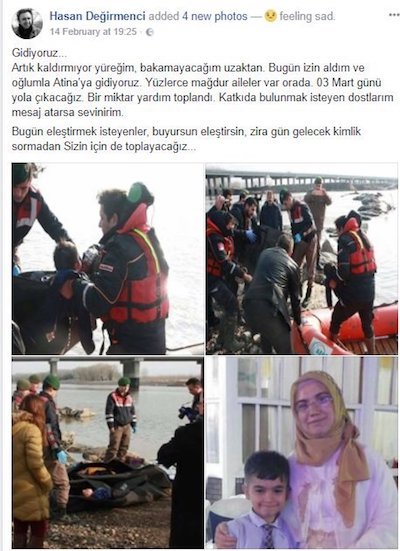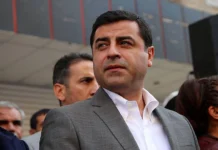The widespread persecution being carried out by the Turkish regime led by autocratic President Recep Tayyip Erdoğan following a controversial coup attempt on July 15, 2016 has led to a new tragedy across the border. Hasan Değirmenci (43), who visited Greece to help refugees who had to flee Turkey because of a massive post-coup witch hunt targeting alleged members of the Gülen movement and take shelter in Greece, had a heart attack and passed away.

According to a report by Turkish online news website TR724, Degirmenci began to feel poorly when he started listening to the troubles of a Turkish family he visited in Greece on Sunday afternoon. When he went to the sink to wash his hands, he reportedly fainted and was immediately taken to Tzaneio Hospital by ambulance. He was believed to have suffered a heart attack; however, emergency services were unable to resuscitate him.
The unexpected death of Değirmenci, the father of three sons, has shocked his family, relatives and friends. His family and relatives reportedly traveled from Stuttgart to Athens. The Turkish refugees who he met in Athens refused to leave his son Ensar alone in front of the hospital. His friends said Hasan Değirmenci was a sincere, self-sacrificing and friendly man.
Değirmenci had shared photographs of the teachers and their children who died in the Evros (Meriç) River on his personal facebook page and stated : ”We are going [to Greece]. My heart could not bear this agony. I could not watch this agony from afar. Today, I have gotten permission from my employer and I am going to Athens with my son. Hundreds of victims are there. We are set to go on March 3. Some aid was collected. I would it if appreciate if my friends who want to contribute would send me a message.”
Thousands of people have fled Turkey due to a massive witch-hunt launched by Turkish government against sympathizers of the Gülen movement. Many tried to escape Turkey by illegal means as the government had cancelled their passports like thousands of others. On Feb 13, 2018 at least three people died and five others were missing after a boat carrying a group of eight capsized in the Evros (Meriç) River while seeking to escape the post-coup crackdown in Turkey.
Greece’s asylum service says more than 1,800 Turkish citizens requested sanctuary in 2017, a tenfold increase over the previous year. This places Greece in second place behind Germany as an EU destination of choice for Turks believed to be fleeing the sweeping measures following the coup bid.
Turkey survived a controversial military coup attempt on July 15, 2016 that killed 249 people. Immediately after the putsch, the Justice and Development Party (AKP) government along with President Erdoğan pinned the blame on the Gülen movement.
Fethullah Gülen, who inspired the movement, strongly denied having any role in the failed coup and called for an international investigation into it, but President Erdoğan — calling the coup attempt “a gift from God” — and the government initiated a widespread purge aimed at cleansing sympathizers of the movement from within state institutions, dehumanizing its popular figures and putting them in custody.
Turkey has suspended or dismissed more than 150,000 judges, teachers, police and other civil servants since July 2016. Turkey’s interior minister announced on December 12, 2017 that 55,665 people have been arrested. On December 13 the Justice Ministry announced that 169,013 people have been the subject of legal proceedings on coup charges since the failed coup.
A total of 48,305 people were arrested by courts across Turkey in 2017 over their alleged links to the Gülen movement, said Interior Minister Süleyman Soylu on Dec. 2, 2017. “The number of detentions is nearly three times higher,” Soylu told a security meeting in İstanbul and claimed that “even these figures are not enough to reveal the severity of the issue.”















